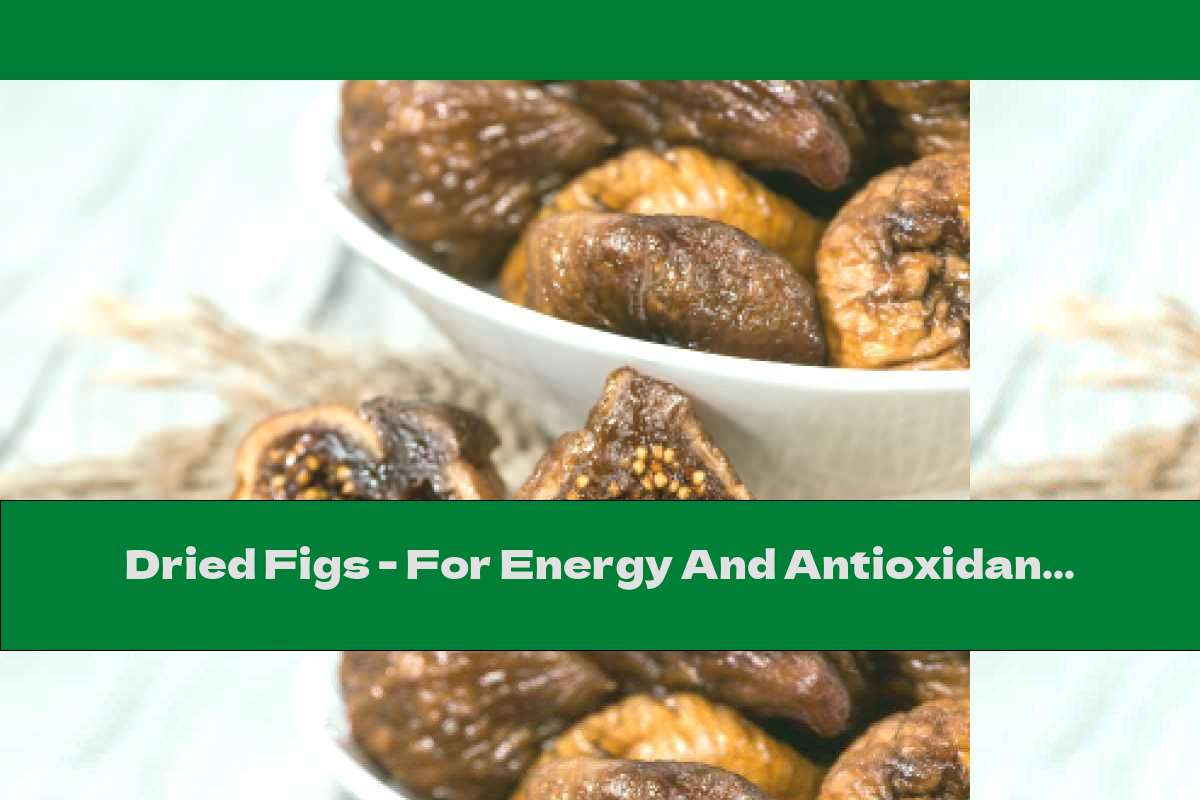Dried Figs - For Energy And Antioxidant Power
 Author: Karen Lennox
Time for reading: ~2
minutes
Last Updated:
August 08, 2022
Author: Karen Lennox
Time for reading: ~2
minutes
Last Updated:
August 08, 2022

In this article, learn more about Dried Figs - For Energy And Antioxidant Power. The "false" fruits of the fig tree are among the healthiest foods..
Delicious and juicy figs are widely known as fruits, but technically they are not. Representatives of the so-called " false fruits ", figs are actually syconia - fleshy stems containing the flower parts and seeds of the fig tree.
Both fresh and dried figs contain many useful compounds that are of particular benefit to the human body.
Fresh fruits are very perishable and within 8 days after picking they begin to spoil. Due to this fact, more than 85% of the figs offered on the world market are dried. However, do they retain their usefulness after drying?
Over 60% of the water content of figs is lost in the drying process. This makes the "false" fruit a much more concentrated source of calories, nutrients and fiber than fresh figs. 100 g of dried figs contain: 219 mud, 3.3 g of protein, 0.9 g of fat and 63 g of carbohydrates. The same amount, according to the Indicative Daily Intake (RDA), provides the body with 25% of the fiber needed for the day, 14% potassium, 15% vitamin K, 16% calcium, 18% magnesium and 16% of the required iron.
Figs are among the richest in mineral compounds plants. Dried figs, according to a study by the US Department of Agriculture, are among the fruits richest in fiber, manganese, magnesium, potassium, calcium and vitamin K , all in optimal amounts for human needs.
Due to their high content of polyphenols and flavonoids such as rutoside, gallic, chlorogenic and syringic acids, dried figs are one of the most powerful antioxidant bombs . A study conducted at the University of California demonstrated their antioxidant power - just two medium-sized dried figs, about 40 grams in total, significantly increased plasma antioxidant activity - an effect that protects blood and blood cells from damage and mutations caused by free radical particles.
Soluble fiber contributes to faster satiety of hunger and maintains healthy blood sugar and cholesterol, while insoluble fiber supports and regulates digestion. Potassium in fruits maintains the body's balance of fluids and electrolytes - a property extremely important for the normal function of nerves and heart muscle .
They are also an excellent source of energy because most of their calories come from simple, rapidly degradable sugars. Their amount should not be a concern, because they are taken together with the fiber of the fruit, which slows down the release of sugars into the blood.
When choosing dried figs, they should not have a whitish layer of pollen on them - a sign that they are sprayed with poisonous pesticides and preservatives to extend their shelf life.
Related Articles
- The Power of Honeysuckle: Health Benefits and Recipes
- The Power of Yeast: Nutrition Benefits and Uses
- Understanding Energy Balance in Nutrition: A Comprehensive Guide
- Understanding Energy Balance in Nutrition: Tips for Achieving a Healthy Lifestyle
- The Power of Milk: Nutritional Benefits for Health and Wellness
Top Nutrition Articles Today
- . Nutrition Guide: Importance of Food Pyramid, Meal Planning,...
- . The Latest Food Pyramid: A Guide to Balanced Nutrition
- . List of Foods that Contain Carrageenan: A Guide to Avoiding...
- . Granadilla - Health Benefits
- . Libre2 Sensor Reset: Extending the Life of Your Glucose Sens...
- . The Truth About Yellow 6 in Nutrition: Health Risks and Regu...
- . Nutrition Trends 2026: Diet Plans, Recipes, and Wellness Tip...
- . Carbs to Sugar Conversion Chart: Monitoring Carb and Sugar I...
- . Disodium 5-Ribonucleotides (E635): Uses, Safety, and Health...
- . The Ultimate Guide to Malic Acid in Nutrition: Sources, Bene...